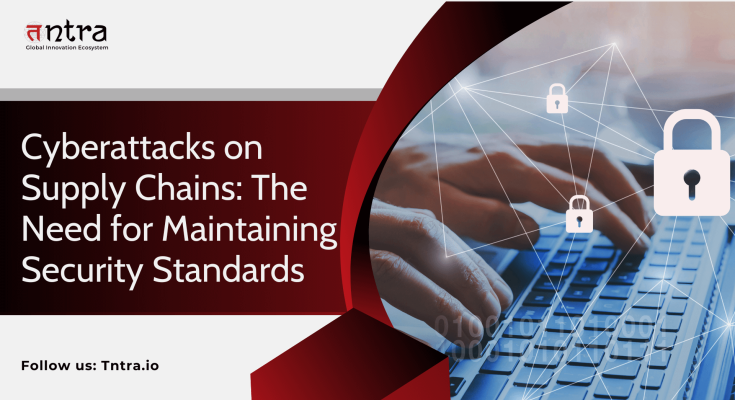The cyberattacks on supply chains mainly consist of data breaches, malware, and data leaks. It can happen internally or externally. Your competitors, hackers, or employees can carry out this security breach. You must have a well-knit SCM solution to avoid leaking sensitive data and infiltrating the company’s operating system without permission.
Walmart is the biggest supply chain and retail platform, but it cannot safeguard the company from cyber espionage in 2023. However, the company now follows the Zero-Trust Access approach to comply with its security operations around 24*7.
The company has deployed automated safety mechanisms and system administrators who have even Ph.Ds. in computer science and internet security to curb data breaches. They have deployed an Internal Security Operations team for full-fledged supply chain security and cybersecurity risk management.
Other in-depth security best practices deployed are all automated, which makes the traceability of malicious emails or messages easy, which has helped the company eliminate ‘8.5 billion malicious bots’ from their system. Walmart’s best supply chain management solutions include aligning with data privacy regulations and security standards.
The automated and purposely built internal security capabilities are helping remove these Grinch Bots from their system. This has led to millions of Software Supply Chain Attacks (SSSCA) to stop completely. The strengthening of the cybersecurity management system has helped the company provide access to sensitive consumer and financial data to the people deployed for the job. In many situations, only Executives can access the network, files, and other applications.
Source: Beta News
Statistical Approach Providing Insight into Cyberattacks on Supply Chains
According to Gartner, almost 45% of the industries will have experienced cyberattacks by 2025. It is three times more than the cyberattacks and breaches in 2021. So, the company must have regulated Security Incident Response Plans in case a data breach happens. Moreover, supply chain companies must use the right supply chain management system and proven methodologies and practices.
The cyberattacks on supply chain companies have increased by 633% since 2022. The vulnerabilities sit at over 88,000, reaching a level where the company’s open-source library information is exposed big time. 12,000 malicious supply chain attacks have been reported already. So, this calls for the best supply chain management software solutions and shows how collaboration with new economic approaches will revolutionize the whole supply chain system.
The global cybersecurity market will increase to $183.10 billion in 2024, and the market size will increase to $273.60 billion by 2028. The CAGR is expected to grow at 10.56% between the forecast period of 2024 and 2028. The USA will capture the market with nearly $78,310.0 million in 2024.
(Source: https://www.statista.com/outlook/tmo/cybersecurity/worldwide)
Apart from expenditure on supply chain software and logistics management solutions, the organizations will spend almost $600 billion on Public Cloud Services. The expenditure saw an 18% growth over 2022. The PaaS structure in Cloud Services saw tremendous growth of 23.2% in 2023, and SaaS recorded a growth of 16.8% in the same year.
What Are Some Types of Cyberattacks on Supply Chain And Necessary Solutions to Curb Them?
1. Network Supply Chain Attack
The network of the supply chain companies is compromised because of phishing, malware attacks, user credentials theft, etc. To curb this menace, it is necessary to include security best practices for your supply chain system to get complete transparency and traceability in the movement of products.
2. Keeping An Eye on Third Party Entities
Third-party entities are increasing in supply chain cyberattacks because most companies have collaborated with third parties to ship their products. Lack of visibility on these entities may cause a huge threat to the supply chain companies. So, third-party security systems must be installed so that they can only get required access to data and do not receive backdoor access.
3. Vendor Frauds Are Leaping
The ransomware in the supply chain causes vulnerabilities to companies’ data. Supply chain companies often leverage vendors in their data systems, and hackers use social engineering concepts to convince companies to change their payment systems. It leads to no payment to actual vendors, which gets deposited in hackers’ accounts. So, proper Vendor Risk Management is necessary to avert hardware tampering or compromising software.
4. Bills of Material Sabotage
The supply chain companies must maintain a proper Bill of Materials (BOM) Security in which all the details about product parts and their traits are mentioned. Like, 100 tabletops, 100 table brackets, bolts, etc. These files are mainly procured digitally from third-party vendors. So, if they use compromised software, the data can reach the hackers.
It means you will be clearing bill money to the hackers and not actual vendors. It can create legal disputes. Therefore, BOM Security can be maintained by correcting your system’s Dependency Management Vulnerabilities and alerting the third-party vendors.
Get in Touch With the Best Supply Chain Software Solution Provider!
The secured supply chain software development services can help avert any data breach or malicious activity making its way to your organization. You must hire a professional software product engineering company, Tntra. We provide secured and real-time transformative solutions to secure your supply chain systems digitally. You can track, trace, and secure your industry’s supply chain and logistics.
Call Tntra experts to discuss your industrial requirements and get top-notch services from the best supply chain management systems provider.



